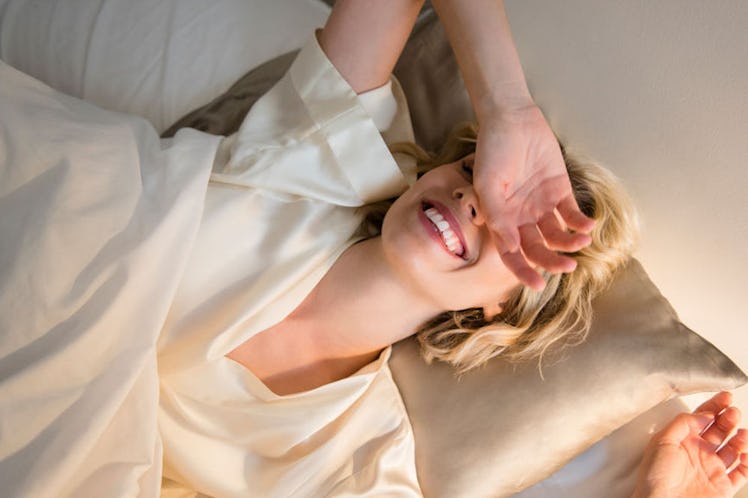
Sleep Experts Say You Probably Shouldn't Snooze With Your Mouth Open & Here's Why
If my dad is having an especially great nap on a Sunday afternoon, he's probably asleep with his mouth slightly open as his snores fill the living room. When my siblings and I were younger, we would sometimes make tiny balls out of paper and see who could throw the most into our dad's open mouth before he woke up and caught us. But besides the obvious risk of getting pieces of paper thrown into your mouth (or worse, a curious spider or cockroach), is sleeping with your mouth open dangerous? According to experts, even though it might seem like a harmless habit, it's really one that you should try to break if you can, as it can sometimes lead to a couple of different health issues.
"Humans are not ‘designed’ to breathe through their mouths," Bill Fish, certified sleep coach and founder of sleep company Tuck, tells Elite Daily in an email. "The nose acts as a filter of sorts for any bacteria you are breathing in, whereas the mouth is not filtering anything, thus you are taking in higher-quality oxygen when breathing through the nose," he explains. This difference in breathing goes a long way in making sure that you get eight hours of high-quality sleep at night.
But there's actually even more at stake than poor sleep if you tend to be a mouth-breather when you snooze. Mark Burhenne, DDS, founder of AsktheDentist.com and author of the book The 8-Hour Sleep Paradox, says that breathing through your mouth throughout the night can lead to a whole host of physical health problems, including dry mouth, cavities, bad breath, and brain fog.
"You need to nose-breathe to produce optimal nitric oxide through the night," he tells Elite Daily, "which is the nutrient your body uses to heal itself while you sleep."
Aside from things like dry mouth, sleeping with your mouth open is sometimes associated with more serious health issues, according to Dr. Burhenne. If you sleep this way on a regular basis, he says you could be putting yourself at a higher risk of developing certain cognitive health issues, as well as high blood pressure, chronic inflammation, poor immunity, and chronic pain, just to name a few.
"Of course, all of these are all multifactorial and not caused by just one thing," Dr. Burhenne clarifies. "However, nose-breathing via mouth tape can help reduce your risk by increasing nitric oxide in your bloodstream."
Of course, "mouth tape" probably sounds a bit odd at first — like something your older siblings may have once used to get you to stop crying as a kid — but it can actually be pretty useful for sleeping mouth-breathers. If you're curious to try it out and train your body to sleep with your mouth closed, just be sure to pass over the duct tape or packing tape. "If you would like to try mouth taping, using a micropore tape would be in your best interest," says Fish. "The adhesive properties of the tape would be strong enough to keep the lips sealed, but not too strong that you couldn’t open your mouth if you needed to." Plus, since the product is designed specifically for this use, it won't painfully rip out any baby hairs when you take it off in the morning.
If you do decide to test this out for yourself, Dr. Burhenne suggests that you pay close attention to how it goes. There's no reason you shouldn't be able to sleep with a closed mouth, he says, unless your airway is blocked. "If you find you're unable to sleep through the night without the tape on after a couple weeks, it's probably a great sign you should see your doctor about a sleep study," he tells Elite Daily, so check in with your doctor to make sure you get the best night's sleep you possibly can.